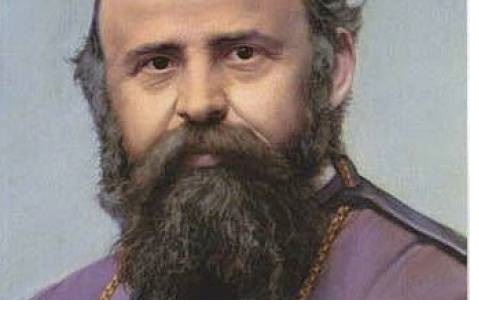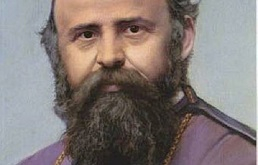"Knowing how to suffer for Africa".
Pope exalts Daniele Comboni's missionary adventure
 By Gianni Valente
By Gianni Valente
Juba (Agenzia Fides) "I have only the good of the Church in my heart. And for the conversion of my African loved ones I would give a hundred lives if I could". This is what Daniele Comboni said of himself, revealing even with the strong expressions of his speech the volcanic and impetuous temperament. Because of his missionary passion, he recounted that he had to "Fight with potentates, Turks, atheists, freemassons, barbarians, elements, priests ... but all our trust is in him who chooses the weakest means to do his works". Today Pope Francis recalled the memory of the missionary saint in Saint Theresa's Cathedral in Juba, where he met with bishops, priests, deacons, consecrated men and women and seminarians, on the second day of his apostolic journey to South Sudan. "We can remember," the Pope said at the end of his address, "Saint Daniele Comboni, who with his missionary brothers did a great work of evangelization in this land: he said that the missionary must be willing to do everything for Christ and for the Gospel, and that there is a need for bold and generous souls who know how to suffer and die for Africa".
Daniele Comboni, one of the greatest missionaries in recent history, beatified in 1996 and proclaimed a saint by John Paul II on October 5, 2003, came from a peasant family. Born in Limone sul Garda, the only survivor of eight children, he had entered the Seminary in Verona and then starting to attend the missionary institute founded by Father Nicola Mazza. The priest, with the support of the Congregation of Propaganda Fide, had brought a number of young Africans to Italy to train them and then encourage them to carry out missionary expeditions to the regions of central Africa.
Ordained a priest on December 31, 1854, in the month of the proclamation of the Dogma of the Immaculate Conception of Mary, 26-year-old Daniele was the youngest of the five priests whom Fr. Mazzi, 3 years later, sent on mission. "Remember," he told them before departure, "that the work to which you consecrate yourselves is His work. Work only for Him, love and help each other, be united in everything, and God's glory, God's glory alone always promote and intend, that all the rest is vanity". After the long journey, which also included a pilgrimage to the Holy Land, the young missionaries arrived in Khartoum and then by boat on the White Nile, they went further south, 1,500 kilometers, to Holy Cross, the last mission station in front of the impenetrable forest. But before long, three of the five died of hardships and fevers. The missionary expedition ended in failure. Propaganda Fide entrusted the lands to the Apostolic Vicariate in Alexandria, Egypt.
On his return to Italy, other tribulations arrived. Comboni, after praying in St. Peter's, drew up a "missionary plan" that contemplated among other things, the establishment of the first missionary outposts along the coasts and the involvement of female missionaries to proclaim the Gospel among the people in sub-Saharan Africa who did not know Jesus. But in the meantime, the bishop of Verona, after Father Mazza's death, forbade the missionary institute he founded from accepting new seminarians.
In the growing anti-clerical climate of the nascent Italian state, Comboni managed to give life to the new Institute for the Missions of Nigrizia thanks to Pius IX's support of Cardinal Barnabò, Prefect of Propaganda Fide.
The Institute was born in Verona in 1867. And in the time that followed, Comboni traveled around Europe seeking material and spiritual aid for the new work. He attended cloistered convents and dinners in aristocratic homes. He entrusted the institute to Saint Joseph. Later, he thanked the putative father of Jesus in his writings, "who never allowed me to go bankrupt and never denied me any temporal grace".
Around the work of Comboni (who in 1872 also founded the Women's Institute of the Pious Mothers of Nigrizia in Verona) hostility, slander and clerical and anti-clerical attacks soon unleashed. Among other things, his missionary intuitions dangerously crossed the interests that were moving along the slavery routes in Africa for centuries.
In letters to friends, Comboni showed awareness of "Deceptions, illusions, lies, guilty suggestions" that surrounded him. Yet Propaganda Fide supported his unconditional dedication to the mission. In 1877, he was ordained a Bishop, and in December of the same year he began an expedition with a large group of missionaries that after nearly a year's journey took him to Khartoum. These are the last four years of intense work for him, a time when he had the joy of visiting and seeing the missions south of Khartoum flourish: Delen, Gondòkoro, Gebel, Nuba, Holy Cross, El Obeid... Even at that time, as physical illnesses began to inexorably affect his health, hostility and malice, which came upon him from ecclesiastical circles, weighed heavily on him. In a letter to a priest, he wrote that the extreme climate of El Obeid made it difficult for him to sleep and eat. And he told of the "bitter pills" he had to swallow, "that it is a miracle if I can survive. I work for the glory of God and for poor souls as best I can, and I go on and do not care about anything else, certain that all the crosses I have to bear are by God's will, and therefore will always be dearer to me".
In July 1881, tremendous thunderstorms and cross fevers on the return trip from El Obeid to Khartoum undermined his health forever. In the last months of his life he saw his closest friends and collaborators die from malignant fevers. Meanwhile, concerns grew over the political situation in Sudan where conflicts and dramatic revolutions such as the anti-British uprising led by Islamic leader Mohammed Ahmed el Mahdi are increasing. In a letter to the Prefect of Propaganda Fide, Comboni wrote that "the works of the Lord were always born and grew in this way," and told him the story "of our lay brother Paolo Scandi from Rome, who helped the mission as a blacksmith. He was little more than a boy. He died saying, 'I am happy. Sweet is that 'fiat' that says, understands, embraces everything".
A short time later, Comboni also ended his days at the age of 50, after having called his friends around his dying man's bedside to thank them and ask for forgiveness. Before losing consciousness," recounted the priest who assisted him in the final stage of his illness, "he wanted to embrace the cross ... he fell asleep placidly, like a child.
Source : fides.org

